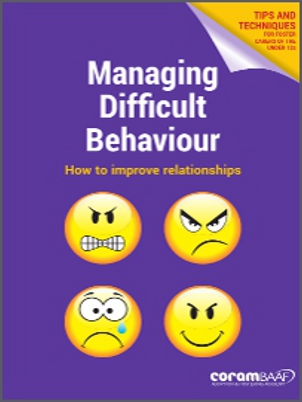
Managing difficult behaviour
£14.95
Would you like to develop a better relationship with the child you are caring for? Do you sometimes struggle to deal with your child’s tantrums, rudeness or aggression? Does your child often play up to get your attention? Do they sometimes wind you up until you feel desperate?
If you answer yes to just some of these questions, this book is for you.
Fostering is a challenging and important role. It changes children’s lives, but it can make many and varied demands on foster carers. Some of the challenges arise from children presenting behaviours that can be difficult to deal with.
Managing difficult behaviour provides foster carers with new skills to help them manage a child’s behaviour and improve their relationship with them. It is full of useful tips, case examples and exercises.
The book does not provide all the answers – there are no “right” answers when dealing with the variety of ways that traumatised children express their frustration, anger, stress and insecurity. But it does set out ways in which foster carers can help children, in their own way and in their own home.
The training outlined in Managing difficult behaviour is based on the Fostering changes programme set up at the Maudsley Hospital in London.
The book is for foster carers looking for practical advice and tips on managing challenging behaviours in children under the age of 12, and improving their relationship.
AVAILABLE IN EBOOK AND HARD COPY
Questions about eBooks? Check out our FAQs
HARD COPY
Reviews
This book teaches skills I have used in the past and intend to try at the appropriate time. I found some of the chapters extremely helpful and could see the logic of why they would work. The book was very easy to read, clear and had a little humour with cartoon illustrations. I found the real life experiences of foster carers putting into practice the skills really encouraging. This is a book I would recommend all carers read.
Rita Mistry, Foster carer, Foster Families magazine
This book covers themes of behaviour and their management, Although designed for foster carers, it could also be used for kinship carers who may need to rethink the way they respond to some difficult behaviours. In addition, the ideas in some sections could inform professionals in parenting assessments.
Lynne Barry, former children’s guardian and now independent social worker, Seen and Heard 19:1
